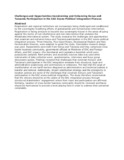| dc.contributor.author | Wakhungu, J. P. | |
| dc.contributor.author | Okoth, G. P. | |
| dc.contributor.author | Odhiambo, E. O. S. | |
| dc.date.accessioned | 2021-12-14T11:52:56Z | |
| dc.date.available | 2021-12-14T11:52:56Z | |
| dc.date.issued | 2021-01 | |
| dc.identifier.govdoc | https://www.scirp.org/journal/paperinformation.aspx?paperid=106731 | |
| dc.identifier.uri | https://doi.org/10.4236/ojps.2021.111009 | |
| dc.identifier.uri | http://ir-library.mmust.ac.ke:8080/xmlui/handle/123456789/1810 | |
| dc.description.abstract | Regionalism and regional institutions are increasingly being challenged and conditioned by the sovereignty-modifying effects of globalisation and humanitarian intervention. Regionalism is facing pressure to become less sovereignty-bound in the sense of going against the norms of non-interference and non-intervention that underpin the Westphalia international system. The study evaluates the challenges and opportunities that constrain and enhance Kenya and Tanzania participation in the EAC econo-political integration process. Three theories, Two-Good theory, Neoclassical Realism and Neo-functionalism theories, were adopted to guide the study. Descriptive research design was used. Respondents were both from Kenya and Tanzania and they comprised cross border business community, government officials in Ministries of EAC and Foreign Affairs, and EAC organs—the Secretariat and Legislative Assembly which were purposively sampled. Both primary and secondary sources data was used while instruments of data collection were: questionnaires, interviews and focus group discussions guides. Findings revealed that challenges that constrain Kenya’s and Tanzania’s participation in the EAC integration emanate from structural, legal and administrative weaknesses and commissions or omissions. The fact that the issue of manifestation of non-tariff barriers disguised as administrative and technical policies is baneful and inimical. Additionally, import substitution strategy and the incongruity in taxation policies are some of the challenges that constrain Kenya’s and Tanzania’s participation in the EAC econo-political integration. The study therefore recommends that the citizens should be at the centre of the EAC integration process through structured stakeholders’ engagement where their input and participation are affirmed. Similarly, taxation of cross border business community should be reviewed and taxes should be harmonised to provide a level playing field in order to address their perennial complaints. | en_US |
| dc.language.iso | en | en_US |
| dc.publisher | Scientific Research | en_US |
| dc.subject | Challenges, Opportunities, Constraining ,Enhancing, Kenya, Tanzania Participation, EAC, Econo-Political, Integration, Process | en_US |
| dc.title | Challenges and Opportunities Constraining and Enhancing Kenya and Tanzania Participation in the EAC Econo-Political Integration Process | en_US |
| dc.type | Article | en_US |

